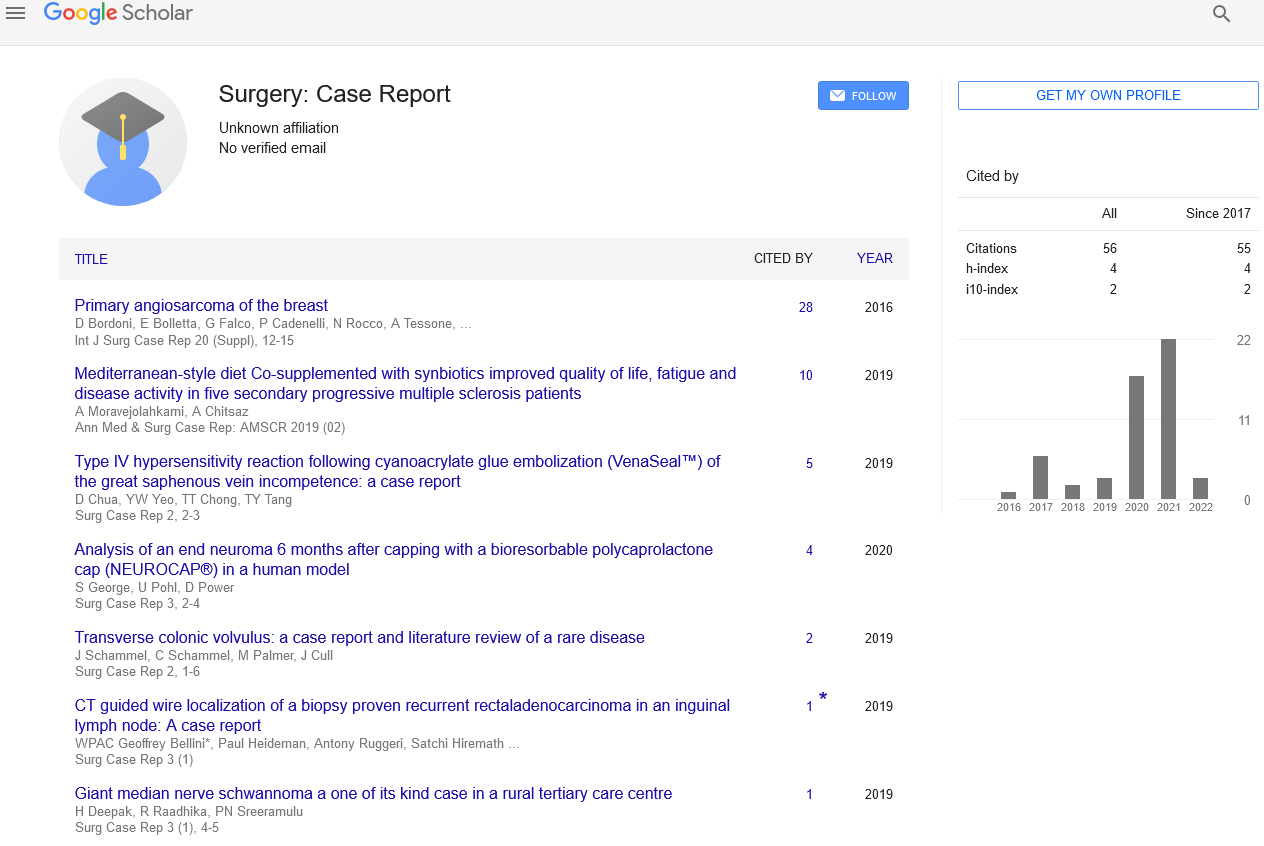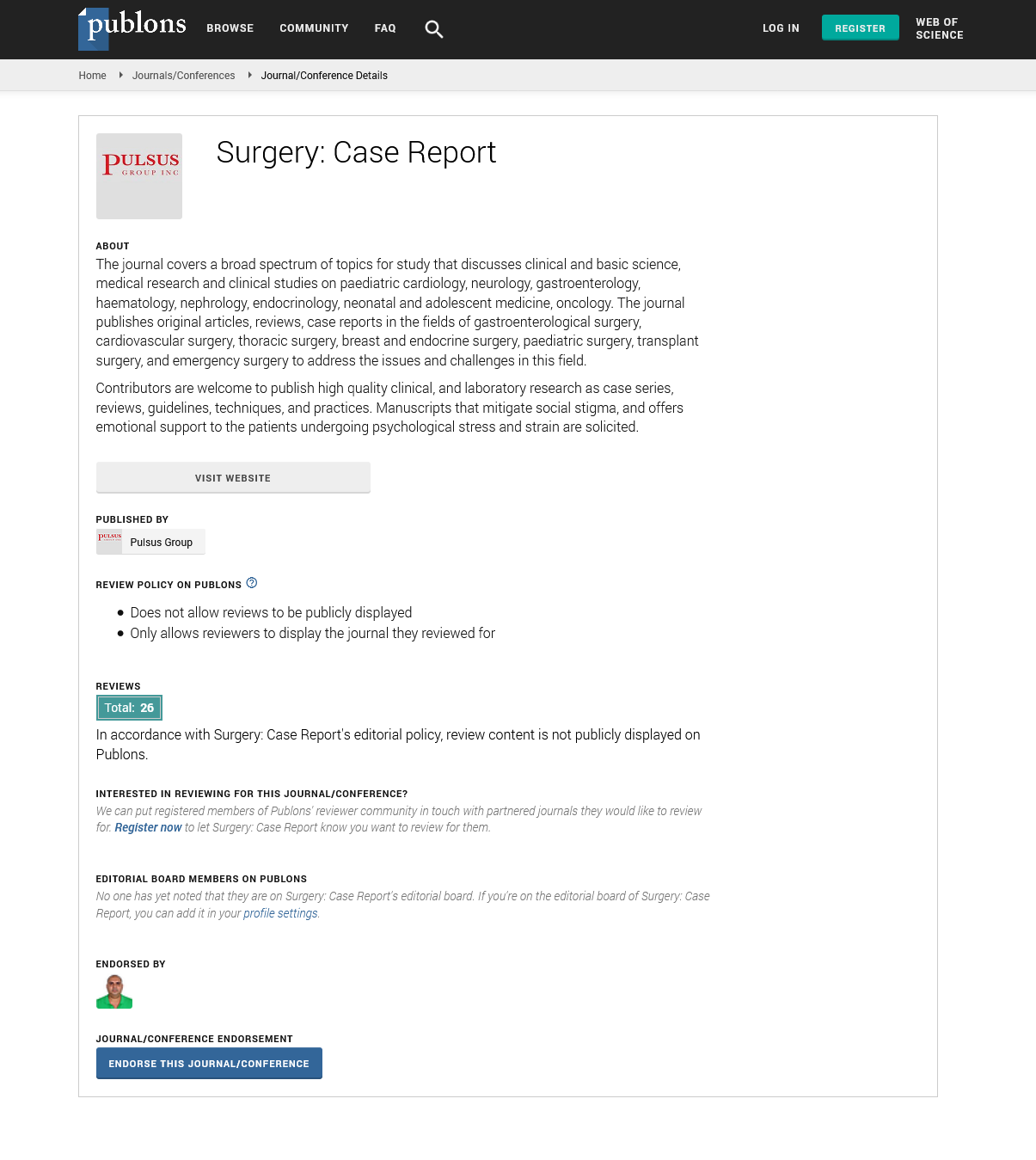Mental willingness, PTSD and surgical outcomes correlation: Overview
Received: 07-Sep-2021, Manuscript No. 3843; Editor assigned: 10-Sep-2021, Pre QC No. 3843; Accepted Date: Sep 26, 2021; Reviewed: 17-Sep-2021 QC No. 3843; Revised: 25-Sep-2021, Manuscript No. 3843; Published: 28-Sep-2022
Citation: Kumar P. Mental willingness, PTSD and surgical outcomes correlation: Overview. Surg Case Rep. 2021; 6(1):1-1.
This open-access article is distributed under the terms of the Creative Commons Attribution Non-Commercial License (CC BY-NC) (http://creativecommons.org/licenses/by-nc/4.0/), which permits reuse, distribution and reproduction of the article, provided that the original work is properly cited and the reuse is restricted to noncommercial purposes. For commercial reuse, contact reprints@pulsus.com
Perspective
Prior operation, anaesthetists assess cardiac and lung health in relationship to operative competency on a constant schedule. But, emotional wellness in relation to operative success is critical and usually ignored. Yearly, the Soldiers Healthcare alone conducts almost 4 lakhs or more procedures, with 8.8 percent of combat personnel identified with Post Trauma Stress Disorder (PTSD) before to operation. Despite its relevance, understanding of Anxiety in connection to aesthetic dosage and surgery results is not studied extensively. PTSD is a trauma- and anxiety condition that causes following a traumatic event. High levels of neuroendocrine activation and oxidative stress, which affect a variety of medical comorbidities, are underlying the mental profile of PTSD, which is relevant to anaesthesiologists. PTSD has been related to metabolic syndrome and overweight, insomnia, tobacco addiction, and bad results in coronary heart disease. PTSD is linked to high incidence of trauma brain damage, physical discomfort, drug /alcohol misuse, anxiety, and memory problems, according to various neurological and well as physiological research data. Such ailments, when considered collectively, lead to a disadvantaged group that needs immediate treatment. Until far, the only evidence on the impact of PTSD on post - operative measures has vary from various research. Professionals with extensive experience treating for ex-servicemen who have participated in wars have made suggestions; nevertheless, the additive utilization dexmedetomidine and ketamine in the prevention of people emerging disturbance seems to be the only applicable therapeutic method really supported by data. There are few research focuses on PTSD in soldiers. The purpose of the detailed discussion before operation is to build patient confidence, evaluate the level of PTSD or anxiety in patients, and detect concomitant illnesses. Effective communication and attentiveness might help to alleviate the communal prejudice and humiliation that many soldiers experience when it comes to about psychological disorders. Because Depression symptoms are aggravated by anxiety, a respected voluntary participation in procedure is essential - with help of social workers or psychiatrists if needed. Providing options for changeable parts of the anaesthesia to service members can assist to develop relationships, reduce anxiety, and instill a sense of autonomy. Lastly, while benzodiazepines are frequently utilized in amnesia and hypomanic symptoms, such use in service members is discouraged given the risk of brief disconnection, which might prevent anchoring procedures or expose the patient to memories. Additional study in soldiers is needed to sustain or deny the use of limited pre-surgical administration of midazolam in PTSD patients who are frequently apprehensive preoperatively. Within operating room, there’s still a lot of support for PTSD. Comfortable comforters, seclusion, and enquiring for their wellbeing regularly all help to build a welcome atmosphere. In some older adults, additional drug and prevention of gaseous aesthetics may minimize the frequency of emerging anxiety; the specifics of all these protocols have indeed been addressed previously. Ketamine, on the other hand, has not been shown to decrease disorientation after operation and is associated with delusions and insomnia. As a result, we advise against using it in soldiers who have a history of schizophrenia. Within continuous care of PTSD, the PACU personnel perform a critical contribution. Having a supportive relative or close personal friend available in a quiet recuperation room advance can help to reduce stress. If period before surgery was extremely stress filled, scheduling follow-up appointments with trusted psychological healthcare professionals may be beneficial. Several issues concerning period before operational with regards to PTSD persist unresolved, and rigorous studies are missing. Organizational guidelines to enhance soldier healthcare may be more prevalent as efficient as preventive strategies are more well-established. Patients are more prone to suffer from PTSD, and the sacrifices made by soldiers are admirable, but they come at a high price. As anaesthetists must remember to preserve the independence of their patients and look after all the aspects of their health. Physicians can increase the confidence of PTSD patients and improve his operating experience by using intentional conversation and specific pharmaceutical techniques.






